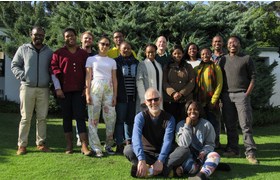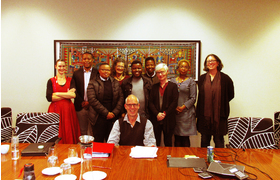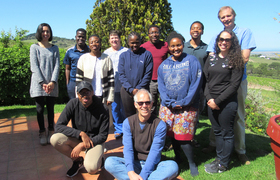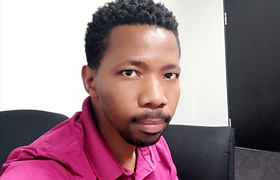Meet a new generation of UCT academics
26 May 2016 | Story by Newsroom
Five new members of staff – all part of the New Generation of Academics Programme (nGAP) – speak about what brought them to UCT, and what they're doing to advance the fields of public law, anatomy, African studies, architecture and human geography.
- How do we professionalise the public service?
Phindile Ntliziywana in public law is committed to improving local government to ensure that it meets the needs of civil society's poorest.
Read more...
- “Believe in the beauty of your dreams”
When Kentse Mpolokeng took up a lectureship in anatomy, she was fulfilling a career ambition she had spelled out to an interview panel years before. But it almost didn't happen.
Read more...
- “Why do we still aspire to whiteness?”
Zuziwe Msomi in the Centre for African Studies interrogates racial identity in post-apartheid South Africa.
Read more...
- Constructing new forms of public space and public life
Sadiq Toffa, who is based in the School of Architecture, speaks of opening up public space in South Africa to alternative forms of democratic life.
Read more...
- PhD examines complex governance systems in Kosi Bay
Philile Mbatha, who is in the Department of Environmental and Geographical Sciences, is studying the influence of complex governance systems on rural livelihoods – and in doing so, she is amplifying the voices and viewpoints of Kosi Bay locals.
Read more...
 This work is licensed under a Creative Commons Attribution-NoDerivatives 4.0 International License.
This work is licensed under a Creative Commons Attribution-NoDerivatives 4.0 International License.
Please view the republishing articles page for more information.
New Generation of Academics Programme (nGAP)
UCT has responded energetically to the New Generation of Academics Programme (nGAP), an opportunity provided by the Department of Higher Education (DHET) to build a new generation of black South African academics. The DHET’s 2015 vision document, “Staffing South Africa’s Universities Framework: A comprehensive, transformative approach to developing future generations of academics and building staff capacity”, proposes a suite of initiatives to address the challenge, with nGAP being the major instrument to increase the numbers of black South African academics.
The programme “involves the recruitment of highly capable scholars as new academics, against carefully designed and balanced equity considerations and in light of the disciplinary areas of greatest need”. The nGAP scholars are appointed into permanent positions where from the outset their conditions are customised to ensure their successful induction into the ranks of established academics.
The DHET provides funding over a six-year period to support the appointment of an nGAP lecturer, and their time is protected to provide the best possible opportunity for the completion of a doctorate degree in the shortest possible time. Once the degree is completed, the nGAP lecturer’s teaching commitments are steadily increased until they shoulder a full teaching load.
Since the first advertisement for nGAP posts in 2015, UCT has been awarded 17 nGAP positions: 5 (Phase 1), 4 (Phase 2), 3 (Phase 3) and 5 (Phase 4). These are distributed across all faculties.
UCT’s nGAP scholars operate as a single cohort, managed and coordinated by Dr Robert Morrell. Lecturers meet for quarterly meetings, writing retreats and various capacity-building activities all designed to support the completion of postgraduate qualifications (particularly doctorates) and to develop records of achievement that will testify to their emergence as self-standing, excellent academics. Each lecturer is mentored by a senior scholar, who provides support and guidance on the challenges that routinely face academics.
The nGAP manager sets great store in building the cohesion of the cohort and encouraging the establishment of new UCT networks while producing a collaborative, mutually supportive and embracing work culture.
According to Dr Morrell, “This group of academics will lead UCT in 15 to 20 years’ time ... Their vision of excellence, of being African and South African, of serving a wider community and producing knowledge for the planet, the continent and the country, will power UCT in years to come.”
Newsletters
In the news









































